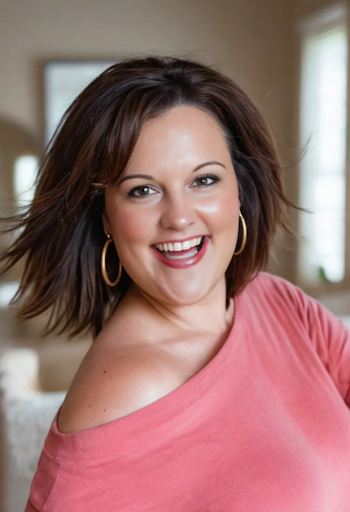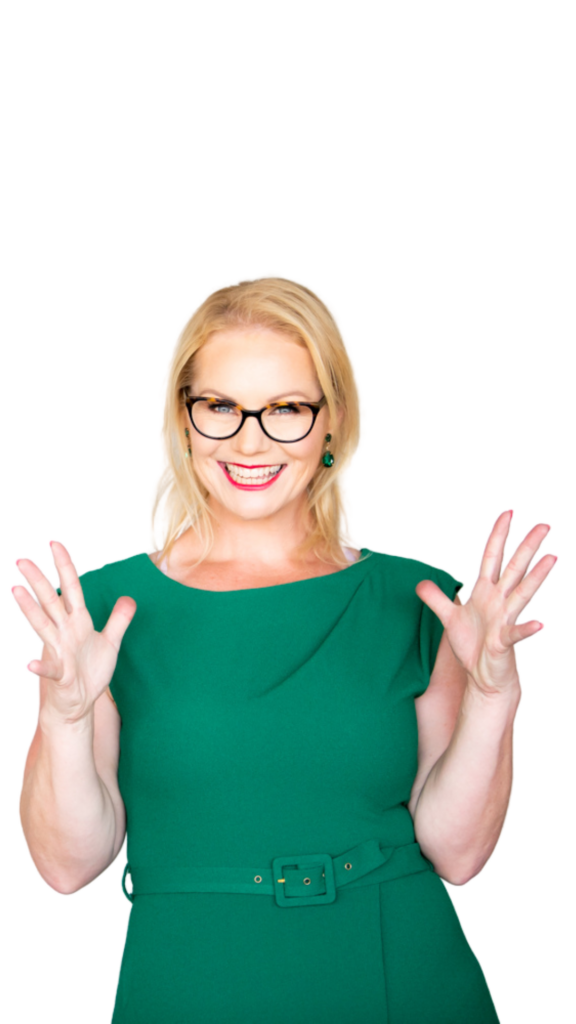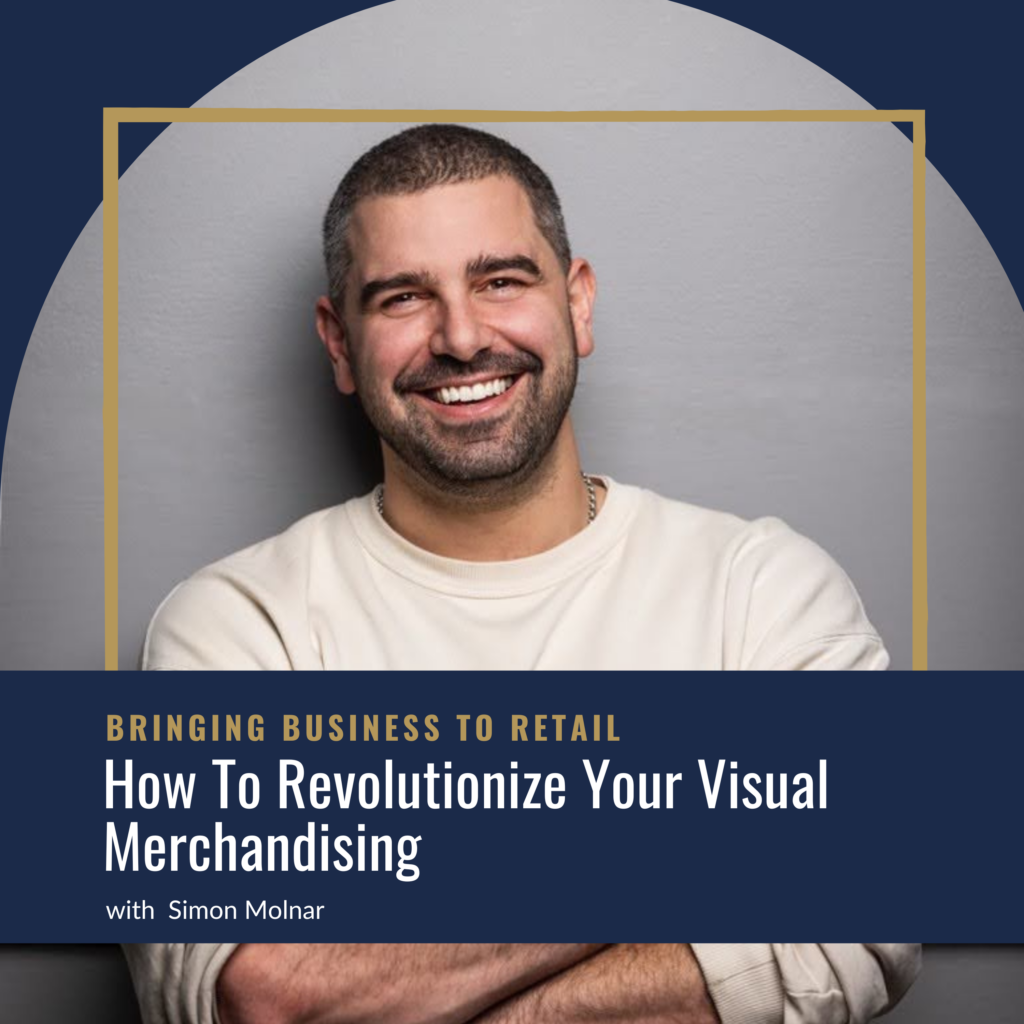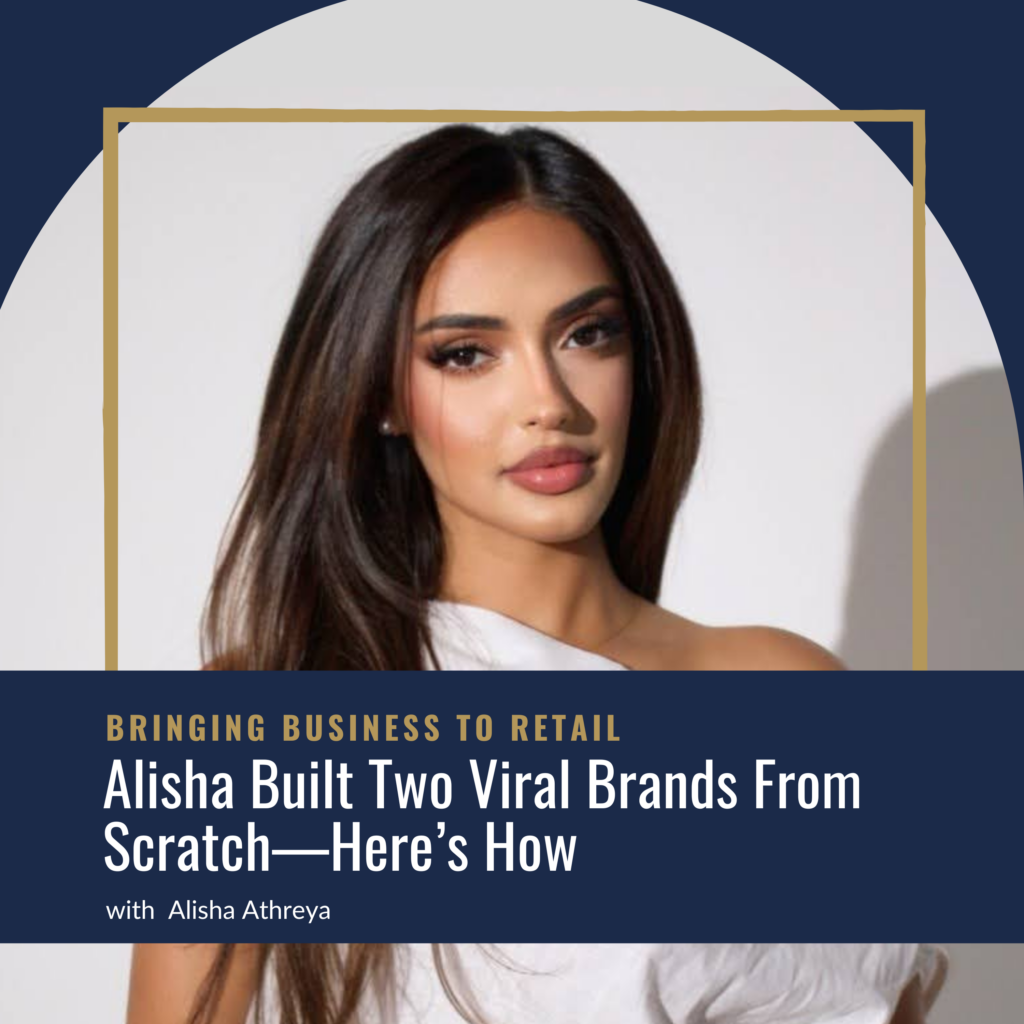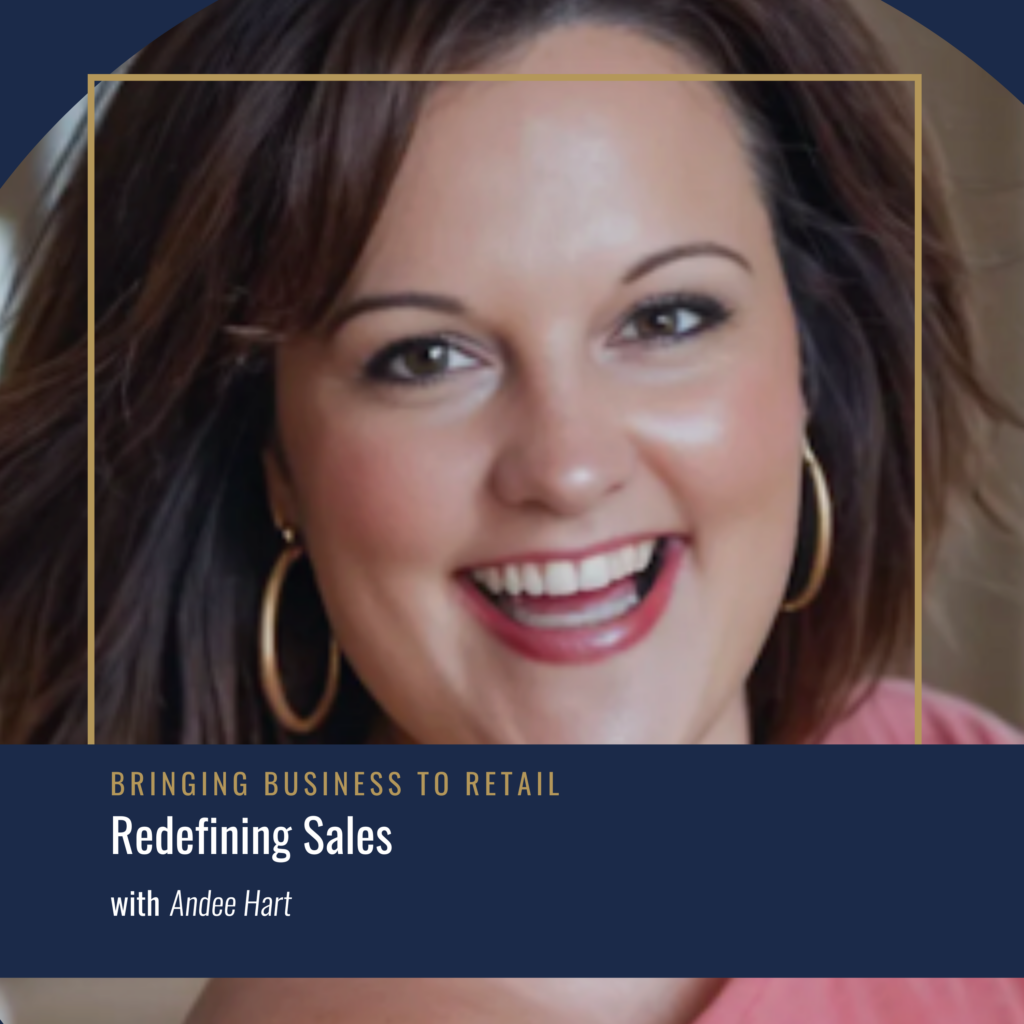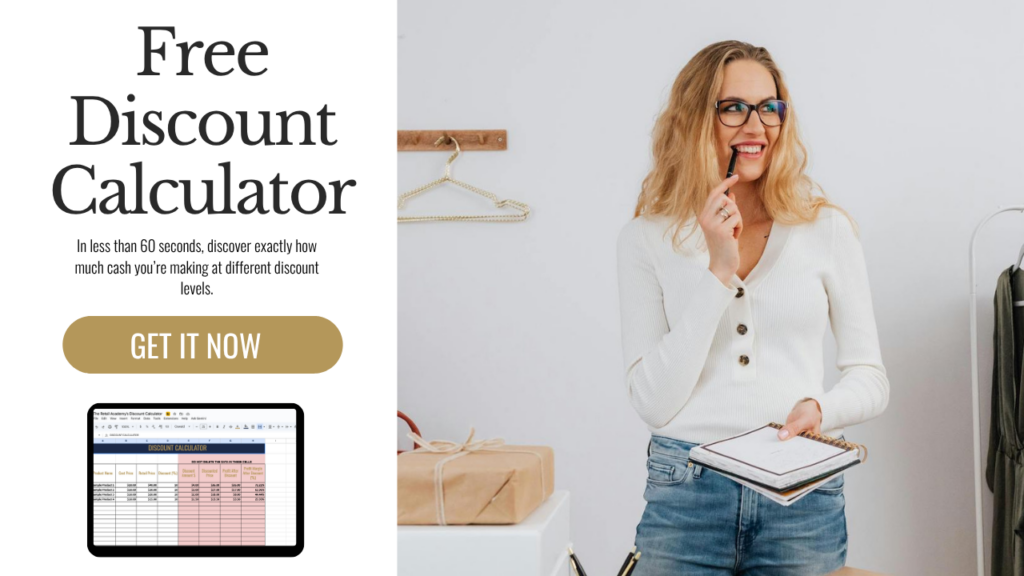
SHOW NOTES
Selling doesn’t have to feel uncomfortable. We’ve all had that moment, the pushy salesperson, the fake enthusiasm, the awkward pitch that makes you want to run the other way. But what if selling could actually feel good?
In this episode, I’m joined by Andee Hart, sales coach and host of She Sells Differently, to talk about how to shift your approach to sales, from manipulation to meaningful connection. Andee shares her journey from tech sales to entrepreneurship, what corporate life taught her about KPIs, leadership, and systems, and how she’s helping small business owners sell with heart and strategy.
We dive into:
- How to sell without feeling pushy or fake
- Why having sales targets actually helps you grow
- The importance of follow-up (and why most people skip it)
- Building better wholesaler–retailer relationships
- How to use customer feedback to create new offers that sell
- And what it really means to lead with service, not pressure
If you’ve ever said, “I hate selling,” this episode will help you rethink what sales really means, and how to make it something you actually enjoy doing.
PS – Grab the free discount calculator to plan your next promotion here
Watch The Video
When it comes to sales, it can feel really icky. I mean, at the end of the day, we've all been in that situation. The used car salesman, the electronics dealer, the lady in the change room who is telling you that that looks great on you and your butt does not look big in it, but you know that that's not correct.
And so even though retail is all about selling. Sometimes we can feel a little bit icky, but what if we could change the way we sell? What if we could sell differently? Well, that is exactly the name of the podcast that today's guest has. She sells differently. And sales coach Andy Hart, is gonna give us some strategies and some tips and some tricks that we can use.
To grow our businesses and to sell in a way that is more aligned with probably how we would love to sell and be sold to as consumers. Welcome back to the Bringing Business to Retail podcast, where we talk all about strategies and solutions to make you more money in your retail or e-commerce business.
Andy Hart, welcome to the show. Thanks so much for having me, Sal. I'm so excited to be here. Uh, we love talking about making money and selling stuff, so I am so glad that you are here. I would love to know before we even jump in, do you know of one of those situations that I just mentioned, the used car salesman, the electronics dealer, the lady in the, it's usually a lady, but the person in the change room telling you, you look fantastic.
In it. In it. When you know that you don't tell me your story. Oh man. This is one of my cringe stories and I bet so many of your listeners can relate. I had actually a. Good friend of mine that long ago, and only share this because I know that they're not listening. Um, they, they are long, long friend ago, but they, they invited me over to have dinner one Friday night and they said, Hey, we would love to catch up.
We have some news we wanna share with you. And I was like. Oh, well that's so sweet. I just knew that they were gonna tell me that they were expecting Everybody knows that situation. Yes. And I was like, that's so sweet. Like they wanna, it made it like they made me feel very special. Like they were having me over for dinner and it was just me.
And I was very, keep in mind, I was very good friends with them. And so I get there and Sal, I kid you not, there were probably 50 other people and I'm, so, I'm thinking in my mind, oh, okay. It's like a party. They're gonna announce to everyone, you know, and they're gonna have dinner and, and so they usher us all in a room and it's a sales pitch for a new travel.
Sales program that they have joined and they're trying to get us all to join with them. And I was a, I was hungry because I came for dinner. That's what they told me. You know? And b, I was so frustrated and so disheartened because I was good friends with them and I was told one thing and made to feel like I was coming.
You know, for something special to hear, something exciting. And I will never forget that moment. And it actually changed our friendship to, to some degree, you know? And so I'm sure everyone has moments like that, but I was like, I never want to be that kind of salesperson, if that's what it takes to, you know.
Manipulate and make someone feel one way when it's completely opposite. That's not the kind of sales I wanna be a part of. So that is my story. I hear you. And as you were talking about that, I just remembered same, same but different. I was young, I'm gonna say I was maybe in my late twenties. And I was, you know, climbing up the, the government ladder, not the corporate ladder, but climbing up the government ladder.
And gentleman who worked for, I worked for the local council and the gentleman who worked for a more affluent local council messaged me and said, Hey, would you love to catch up for coffee? I've got a job that you might be interested in. And so I turned up very similar to you. He tries to sell me into Amway.
I remember just thinking, am I this stupid? Or I didn't really kn he wasn't a friend, he was literally a business colleague and like you, I remember thinking, huh, this is a thing. Like I never wanna be this. Yeah. It was just, it was one of those situations where I also was in the middle of, you know, working towards my MBA and.
They were just very pushy of like, well, you know, not seeking to understand were my goals at the time, which I'm sure we'll, we'll dive into a little bit here in a minute, but. It was just making me feel or trying to make me feel stupid for not joining this or, you know, taking part in this opportunity.
Right. It air quotes, but they were not at all aligned. And so it was just a classic example of not taking time to seek to understand what my goals and aspirations are. What, you know, my. Problem that I was trying to solve was, you know, which my problem at that point, and I wouldn't say problem, but was I wanted to get my MBA right?
I had no time at all for anything else on my plate. And so it was, I was not their ideal client No. At all. No. No. Uh, so speaking of which, you were just saying that you were sitting for your MBA, you were, you were undertaking your MBA, you ended up going to into tech sales. Yes. And. Was there for a very long time.
Can you tell us a little bit about that journey? Because most people don't wake up in the morning and go, I'm gonna do an MBA and I'm gonna get into tech sales. Right? Yes. I think it, it's just funny how a. My path into technology sales happened. I, funny enough, I wanted to be a dance teacher. I grew up taking dance and in competitive dance all my life.
And when I went to university, I had a business plan as a senior to start a dance studio. And one of my college professors, which I actually now just moved back to the town I went. To university, and so I have gotten to catch up with her and we laugh about it. Now we're good friends, but she made me interview for Dell Technologies, which probably so many of your listeners have heard of because they're a global, global company.
But I interviewed and they offered me the job, and I remember just praying about it and thinking this could be really good, real world experience for a year or two. And I could save up and then start my dance studio. In the meantime, I actually had an old dance injury flare up and I had to have knee surgery, and so it would've been really difficult to start my dance studio immediately after graduating.
Fast forward and 17 years later, I was still in technology sales because even though I. Hated having a quota every quarter, every year I thrived on it. It was like a game, and everyone that's ever been in sales always says it's like the golden handcuffs. And so I did it for 17 years until I left and started.
She sells differently and started my candle company. And so yeah, that's kind of just the funny journey. It just kind of fell in my lap technology sales, but it really taught me such valuable skills. In life because no matter what you do, whether you carry a quota or not, you are selling every day. And this is a really, I would love to know before we jump into my question about quotas is.
Do you think she saw something in you that the teacher, and how does she sell this to you? Because we're talking all about sales and we talked about your friends who tried to sell you something that wasn't aligned. It sounds like this teacher was trying to sell you. That's something that wasn't aligned, so why did you do this, but not the travel thing that your friends were selling?
Yeah, that's an interesting thing. I think that she wanted me to get the interview experience. I know that she saw in me the ability to do the job. I think she just wanted me to have the interview experience and whether I did the job or not, I think she would say, now, you know, she knew, you know, I would go places.
I mean, she would say that now, but the job that my friend, or the opportunity that my friends gave me, that was actually years later, I met them in a. My first job at Dell, and so I guess it's just interesting kind of the way the chips fall sometimes and, and how it all happened. But I, I often think back that I could not do what I'm doing now, not even without the sales experience, but also just the life lessons that I learned in corporate and how to run a business, how to manage and lead people well.
So valuable and so yeah, I think it's interesting how. Things happen and everything in life happens to prepare you for something down the road. I want to come back to this question about quotas, because it's itching, it's itching at the back of my brain, but you, you keep having great conversation and I have to just like, take, take, take your week, take us where the conversation is going.
So one of the things that you just mentioned was about how corporate prepared you for, you know, leadership and management and sales and all the things that corporate does. I think that entrepreneurial world is so quick to derive corporate life, and I spent the majority, like I, my first job, my first job was at a video shop, best job in the world, paid to eat chocolate and watch movies, but my first real job, full-time job was working in a cafe until I got my internship as a horticulturist.
And so I very quickly in my. Working career went into government and I, and I kind of moved through different levels of government throughout my career before I went into private enterprise and then went back to government. But I think one of the things that corporate, well, many of the things that corporates do well, and I think as retailers, I say quite often, you know, what are the big box stores doing that we can take and implement because they're spending millions and millions of dollars.
To do these things. So if we can just go, well, that thing works, and put it into my business in my way. Mm-hmm. Why wouldn't we do that? But the things you just mentioned there, leadership systems and processes. Most corporates have very strict systems and processes, and you put this into this file on your G Drive and you, you only use this email and all those sorts of things that if you haven't been through.
Life in a corporate or even a big, you know, big company. You don't even know that that is a standard that you could be emulating in your own way inside of your own business. Yeah. So thank you for sharing that. I think that's such a good point too, Sal, because I have never, I actually did not hate my corporate job whatsoever.
I was not leaving something behind that I. Hated. I'm gonna stop you there. You're an Enneagram three. You are an achiever. So you are saying, did you wa, did you like having a quota? No, I call BS my friend because I love the game. You love the love the game. I love the competitiveness and I loved winning. I loved it.
The stress and, and I say I didn't like the stress. And I'll never admit, I like the stress codependency, but at the same time, when you don't have it, you're stressed because you don't have stress. Mm-hmm. It's weird. Yeah. It's so weird. Yeah. Anyways, I digress, but I, I do think to your point, one of the first things I implemented as an entrepreneur and being self-employed was KPIs.
Right. You know, key performance indicators and goals that I am holding myself accountable to. What did I hate in corporate America is KPIs, performance reviews, and KPIs. Oh, those again, but those are things that I knew the structure, having the structure and the discipline. But the great thing is now is that I get to choose what moves the needle, and so I get to make those decisions.
So it's a, it's a good and a bad thing, right? So yeah, there's, there's wonderful things about being an entrepreneur and there's hard things just like, just like corporate life, the concept of KPI's, key performance indicators. If you are not familiar with that, let's just call them. Standards that you expect things to adhere to that you can measure against.
And what I like about them and having them, because I'm gonna say most business owners that we work with, even I'm talking even eight figure business owners don't have very clear if any KPIs in place for themselves and for their team. But one of the most liberating things I've ever done is say, well, what are all the things that really annoy you?
And let's write those things down because then we can build KPIs that actually move the needle because these things aren't frustrating you or upsetting you. And one of the things that I just, just to give you an example, is you get to set these, and I set a KPI for our ops manager, which is. Zero errors on anything that is deployed live.
And he came back to me and he said, that's not possible. And I said, yes, it is. As, as long as we have tested everything. I'm not talking errors, like the internet went down. Mm-hmm. I'm talking mm-hmm. Things that we had complete control over. And, and he was, he had worked for a big company and he's like, I don't think that that's possible.
And I'm like, well, maybe this is not the right job for you then, because we should be able to test everything before it goes live. And if we don't, then that's, that's on us. That's a systems problem. And it was one of the things, one of my bug bears that actually brought that around, which was, I don't like when customer says the button doesn't work.
I'm like, the button should work. You just didn't test it. Right. And so you mentioned KPIs, but I'm not getting, I'm not letting you get away from this quota thing. So quotas, and you are calling it quotas. We can call it sales targets, we can call it revenue goals. But you mentioned that. It was one of those things that was a bit of a bug bear, but as an achiever, you know, it, it is the thrill of the game.
But for people who aren't Enneagram threes, for people who are maybe, you know, Enneagram ones, if you've never done Enneagram, my friends, go and do the free test. It is so insightful. We make every person that goes through our hiring process, even in the application stage, go through it because we know that certain people work well together and.
You'll tend to find things like operations managers tend to be ones they like perfection with. Usually like a three, eight wing. Three is achiever. I'm an eight, which is like the, the absolute go-getter, the driving force behind everything. As if you couldn't tell that this concept of quotas, you work with wholesalers and so do you.
Is this one of the things that you make them put in place if they don't already have it? We can call it quotas, we can call it goals, we can call it sales targets. But at the end of the day, I think that if you don't have a number written down on paper and we like to do good, better, best, or you know, baseline and stretch goals, I tend to find that businesses don't do as well.
So tell me, are we gonna, are we gonna be aligned on this or not aligned on this? Because it's okay if we don't agree. Yeah, so this is a great question. I find that some. Some small business owners or some of my clients that I work with, they thrive under. Quotas and saying, Hey, you're going to do this many outreach, you know, whatever we're working on that week, and they will thrive under it.
They're like me, where I will write something on a list just to cross it off, right? Some people will just cave under it, and so I don't necessarily implement the same type of coaching or the same type of targets for everyone. I really like to find out what motivates them and really push it from that angle.
Because if you really put a quota per se, and, and sometimes you can articulate it in a different way, but at the end of the day, it's still a quota. It's still a sales target, but you have to really articulate it in a different way that will resonate. With different personalities differently, if that makes sense.
It does make sense because I am very cut and dried, like we work with a lot of product brands and I will, I will literally say. If you wanna get your product into stores, you've gotta do a hundred dials a week. We're aiming for a 25% pickup rate. We're aiming for a 10% conversation rate and a 5% callback, so you can actually make an appointment to call someone back.
Those numbers are slightly different depending on the niche, but realistically, that's kind of the numbers that I work with. And yours might be very different, but I'm like, if you've gotta make a hundred dials to have five, you know if you are lucky, five. Follow up conversations with the buyer, the store owner, whatever that looks like.
Then at the end of the day, if you're not prepared to do that, you are in the wrong business. You have two options. You can pay someone else to do it or you have to do it. Mm-hmm. And when you're starting off, it's usually you. It usually is. Yeah. Right. And I talk about different ways to get your products into retail stores because you have, you know, you can do calls, you can do, if you're local, you can, you know, walk in there.
A lot of people don't. I love, my favorite way is to go in person. If you know, if you're, that's the highest conversion, right, is to walk into a store in person. You can send emails, there's, you can send a pitch package. There's lots of different ways, but at the end of the day, to your point, what you just said, it's a math game.
And so you have to know your numbers and your conversion rate, and when you first start off, it's not gonna be as high as it's going to be. When you really refine your email pitch and you really, and there's a lot of different factors in there. You know, when you, if you don't have great product photography, that's the first thing that when you send a product catalog, someone sees, right?
Oh look, you are preaching to the converted, my friend. Yes. Sometimes I have to start back. And say, Hey, before we're starting to, you know, pitch to retailers, we've gotta, we've gotta rewind a little bit, right? Because we can't send a product catalog that has, there's no brand cohesiveness. Sometimes it's, it's not even a math problem at all.
It's like, we've just gotta go back to the basics of branding, you know? Yep. I love that. I have some questions for you because you have, you've been on both ends of the spectrum. If we can just start with where you were on. If you create your own product, whether that is a handmade product, whether you're having that made for you and you are trying to expand your business and you are looking to get retailers to stock your products, can you give us some tips on, 'cause you said turn up in, in person.
I'm gonna be a little bit sassy and say as a retailer, I freaking hated when reps did that because they would come in generally when you were busy and then they would just stand in a corner and you would be like, this is about you, not about me. You should be here to service me. So can you, I'm gonna ask you to do this and then we're ask gonna, I'm gonna ask you some questions on the retailer side, but maybe if you could give us some tips.
If you are trying to get your product out there, what can we do to try and increase the conversion rate apart from better photography? Yes. Yes. So let's assume you have all your branding and photography and you are like, set right. So first off, let me say this, I did have a retail store before I moved. I did not mind at all when people came in store, but I have a caveat here.
Never come on a busy Saturday afternoon. And if you're gonna stand in the corner, that is the most awkward thing ever that you can do. Come on a Tuesday morning when it's not busy at all. And if it's busy, then you can drop your business card and leave and come back. Right? It's don't be awkward. Don't be awkward.
Read the social cues. That's important as a salesperson. But I always say this, one of the ways that I first started, and I always tell my clients this when I first started. It took me several months to get any wholesale accounts. I heard crickets for a while, but how I started was simply emailing. I found retailers that were aligned to my brand, and so my brand is handcrafted Dough bowl candles.
So these are wooden hand carved. Bread bowl, candles that are reusable and they have a real farmhouse feel and they're giftable. So what I did is I took bright, colorful ribbon and tied around the candles and put a gift tag on them, and so I really marketed them to gift shops as a reusable. Gift. Right?
Something that's gift ready, they could, you know, have it ready for their, their customers to, to, to give. I started sending pitch emails to gift shops, and if I was hearing crickets, I would just tweak one little thing at a time in my email. That's the biggest lesson that I learned in sales. It is about, it's a math number about how many you're, how many pitch emails you're sending out.
But if what you are doing is not working, then you continue to refine your process until you start to hear replies and you start to get the, the replies that you want. And so I remember, I think it was, I was sending probably like 20 to 50 pitch emails a day, and. It was month two, and I think I had like four wholesale orders, month three, that compound effort of all of those pitch emails, I had like 120 retailers in month three.
Congratulations. And did you go back and pick. Those, those original ones, once you kind of started tweaking and, and you're doing marketing 1 0 1 Yeah. Is you only change one thing and then you test it. Yes. And then you change something else and you test it. Because otherwise, if we're changing too many things, we don't know what worked.
But did you go back, because I think this is another thing that people get. Worried about is they're going to annoy retailers or you, you know, they're gonna annoy the buyer. And I'm like, the buyer is getting dozens of emails every day. Like, they probably aren't going to remember you from last week. So 90%.
Of salespeople will never follow up. I think it's after the first follow up email. 90% of of salespeople will never follow up again. So you can be, you can stand out and be in the top 10% just by sending a second follow up email, right? And so I just created a simple Excel spreadsheet, and that's how I stayed organized at first.
Now, I, you know, actually use a CRM and, and all of that. But I absolutely followed up because what I realized, especially when I became a retailer myself, what I realized is that emails. What happens is your inbox is flooded and so emails, retailers are just not even seeing your email. They're busy. They're busy stocking their shelves, helping customers.
And so I remember when I started following up I, the amount of retailers that actually said to me, thank you so much for following up with me. I love your candles, and I meant to place an order and a customer walked in the door and I got distracted. Thank you for following up with me. I call them micro moments like we are.
So connected these days that you are, you know, you're reading your email while you're standing in the, the queue at the shopping, at the grocery store or while you're waiting to pick your kids up. Like we're, we're multitasking. And so it's easy for us to think, I'll come back to that. And then meanwhile, you wake up tomorrow, and I don't know about you, Andy, but I wake up every morning to probably about 80 emails.
You know, 75 of them are junk, but it's all the alerts and the this and the that. And if I'm having a busy day, I just will literally scroll through and delete them. I'm like, if it's important, you'll email me back. And if it's not, it wasn't that important. And it's a mindset shift too, Sal, of really, if you have, I always tell my clients is if you have a product that really serves your customers well, you owe it to follow up with them.
And that's actually serving your retailers. That's not annoying them. You're serving them and you're showing them that you are professional. Brand by following up with them and not ghosting them. Because I hear client, my clients all the time, they're, they'll say, oh, uh, I'm hearing crickets, right? I'm being ghosted.
And I'm like, well, are you following up? Because what you're doing is you're ghosting your retailers now. And so that's so important that you continually follow up with retailers that you're wanting your products on their shelves. Now if we flip it over, I think one of the things that retailers forget, it's in everybody's best interest if we sell a product, so if it's, if you're a supplier or if you're a wholesaler.
You get more orders if the retailer sells more. As a retailer, if you sell more, you make more money, you bring more customers in. But I think a lot of retailers are too scared or maybe don't even know that they can approach their suppliers and their wholesalers and ask for ways to sell the product better.
Now, for me, I, to be fair, this was like 15 years ago and people tell me now, I was so brazen doing this. But I literally, when I worked out, because I didn't grow up in retail when a, the, the lady who did my merchandising, when she mentioned that if you go to a big box retailer and you want to be in the windows, you pay for that.
If you wanna be in the ca, the catalog that goes out into the mailboxes, you pay for that. If you want a specific shelf space, you pay for that. And I was like, oh, I can charge people for this. And so I just decided that I was gonna charge my suppliers if they wanted to be in my windows and they wanted to be in my email and they wanted to be on my social media, they would have to pay.
And I did. I put together this kit where, I think this was a long time ago, but I think it was a thousand dollars. 'cause I had multiple stores and you got a discount if you wanted to be in more than one store. And they could either pay the money or they could give me a thousand dollars wholesale worth of product.
Wow. Which for me was even better, right? Because it meant, yeah, I ordered less, but then I made $2,000 on that product and nearly all of them chose that option. And it was awesome because we literally had our windows filled every month and people were paying me for it. And yeah. I didn't know that that wasn't a thing.
And so I think retailers forget that we can approach the people that we buy product from and say, Hey, how can we work together so that we sell more of your stuff? So can you give us some tips because you've been on both sides. If a retailer is thinking, you know, I really like this product, or I really like working with this brand, how do we approach our wholesalers and our suppliers and say, what can we do to sell more of this stuff?
Yes, that's a great question. I will say this, always approach it from a win-win scenario. And so I think to your point, how if you are talking to a wholesale brand, it's a win-win scenario. If the retailer is selling more of my candles. 'cause they're gonna come back and purchase more. And so I'm willing to work with them to either, you know, give more product or give a discount, you know, or however, whatever that looks like, if they are selling more of my product.
And so there's lots of different ways that you can get creative in that. One of my. Top retailers, one thing we do is we create a custom. We created a custom scent for her and it's, you know, we do a private label, but we did a custom Christmas scent this year, and so it, we only sell it in her shop, and she does do just a little bit extra on that because they're private label, but she sells them like hotcakes.
And I exclusively sell that scent. To her. And so that is a way, and I help promote that for her. We do lives together on social media, and so I help sell it for her. So that's another thing that you can do. You can do joint social media campaigns. You can help if you, you know, are not afraid to sell live on social media.
You can do that with your retailers. That's a huge one. But there's a lot of ways that you can get creative on how to help. Your retailers or for retailers to approach wholesale brands, but make sure that it's a win-win for everyone and you're selling more product. One of the simplest things I think we can do from both sides of the coin as a retailer and as a supplier or a wholesaler, is making sure we have a stockers page.
It amazes me no end. How many retailers don't request to be on a stockers page? I mean, where else are you going to get qualified customers for free? They're literally looking for that brand, for that product, and they want to be able to go and buy it, whether that is online or in store. And it de prizes me how many wholesalers don't even have a stockers page, but also how many retailers don't demand that they are put on that page.
So here's a little secret too, for wholesale brands, one thing that I often teach in, I have a, a free. Well, actually it's, I, I just put it on demand. It's a $25 five day challenge, and one of the things that I teach a little tip is you can find, you don't go to a competitor's. Page, but you can find stockist by going to an adjacent products page.
So for example, when I first started out, how I found a lot of retailers for my candles is I found a really popular chalk paint. Retailers that often carried that chalk paint started carrying my candles. So I went on their website and they had all of their stockist and they had contact name, email, phone number, and I just went crazy calling them and emailing.
And so it's a great way to find stockist if you find an adjacent product and look at their stockist page. I love that tip. Sneaky, sneaky, but it's not even sneaky. It's just smart. It's understanding that if my customer likes this, there's a good chance they're going to like my product as well. And so why wouldn't I like the idea of even you, you found a product that was aligned, but even a, like if you sell.
A hair treatment, finding somebody who sells specific types of shampoos or conditioners or like a complimentary product because then it becomes so much easier to sell. It's kind of like, oh, I noticed that you sell this. Our product is perfect for that. You could bundle it, you could upsell, you could cross sell.
We could give you some trial sizes. It just be, it becomes so much easier for a brand, a, a retailer, to say yes. Yes, and it gives you, to your exact point, it gives you a talking point. In your, whether you're calling or you're emailing, it gives you a talking point to the retailer to say, you know, a personal talking point to say, you know, I noticed that you carry x, y, z chalk paint, you know, and a lot of my retailers carry that chalk paint and my products go perfectly with, you know that.
And so when they hear that, there's already a proof point in there. And so it's, it makes it very easy. As we move into the busiest season of the year, I would love to know for people who are listening, like, what are your top three sales tips to make sure that we're serving our customers, we are making more money, we are making our products more money, and we are just generally doing a great job at promoting what it is we sell.
So the first thing I will say, and this is a, this always amazes me, is how many brands, whether you are wholesaling or not, if you are a product brand or any small business owner, how many brands do not have an email list and are not marketing and building their email list? And so that is one that is your number one marketing asset.
And so as you are going through the holiday season, every single activity that you do, if you are going to a popup market, if you are, whatever, however you're showing up, you should be building your email list with that activity, right? And so I always say to my clients, you know, popup market, if you go to a holiday market.
Your definition, how you judge success from that market is not necessarily just the number of sales that you got from that market. It's also how many emails you got because you can sell to those customers long after the market is over. And so that is a huge one. The second thing, and I already touched on this a little bit, but it is in the follow up.
Like I said, whether you're wholesaling, whether you have, you know, a huge opportunity that landed in your lap from something, how many people never, ever follow up and we miss opportunities because we simply didn't take the time, or we have the mindset. We're being annoying. If you take this personally, you can automate all of this.
It doesn't matter if we're D two C or B2B, you can automate the follow up. Oh yeah, absolutely. There's so many ways that you can automate been one of my favorite things to learn as an entrepreneur is how to set things and forget them. Right. Love it. Love it. Okay, so building our email list, making sure we follow up.
What is your third tip? Always be iterating and making things better, even if they are. This is your product, right? Listening to your customer and just refining and making things that much better with your feedback from your customers. And so I'll give you a specific example in my own product line. I have customers that love a, I have a a one of my best selling scents.
It's called Simply Clean. Of course, everyone loves a really fresh, clean scent, and so I am about to launch a all-purpose cleaning spray and this best selling scent, and it'll be the first product that I've launched outside of a candle. But it is something that has been customer feedback time and time again.
And so that is where I don't often, you know, I don't do a ton of new products. I really niche down in what sells really well. But when you find a best seller and you consistently get that good feedback, don't be afraid to iterate and really. Spread out and, and build upon that and get creative on, on those best sellers.
Make your products even better. Great tips. So email list, follow up, and if you've got, we call them a money fountain. If you've got one of those bestselling products, that's a money fountain, what can we do to capitalize it? Andy Hart, thank you so much. If people want to check out the podcast, where can they find you?
Yes, you can find it on any podcast platform she sells differently. And then my website is andy hart.com. Andy with two Es. Fantastic. Thank you so much. Yeah, thanks Sal for having me. So that's a wrap. I'd love to hear what insight you've gotten from this episode and how you're going to put it into action.
If you're a social kind of person, follow me at the Selena night and make sure to leave a comment and let me know. And if this episode made you think a little bit differently or gave you some inspiration. Or perhaps gave you the kick that you needed to take action, then please take a couple of minutes to leave me a review on your platform of choice, because the more reviews the show gets, the more independent retail and e-commerce stores just like yours, that we can help to scale.
And when that happens, it's a win for you, a win for your community, and a win for your customers. I'll see you on the next episode.
Andee Hart believes sales should feel like service, not survival mode.
With 17 years of executive experience in tech sales and firsthand insight into what burnout really feels like, Andee now helps women product-based business owners simplify their sales, build systems that truly support them, and grow with intention, not overwhelm.
She teaches that it’s possible to increase revenue without becoming someone you’re not, and to automate without losing your magic.
That’s the heart of her work, and she does it differently.


